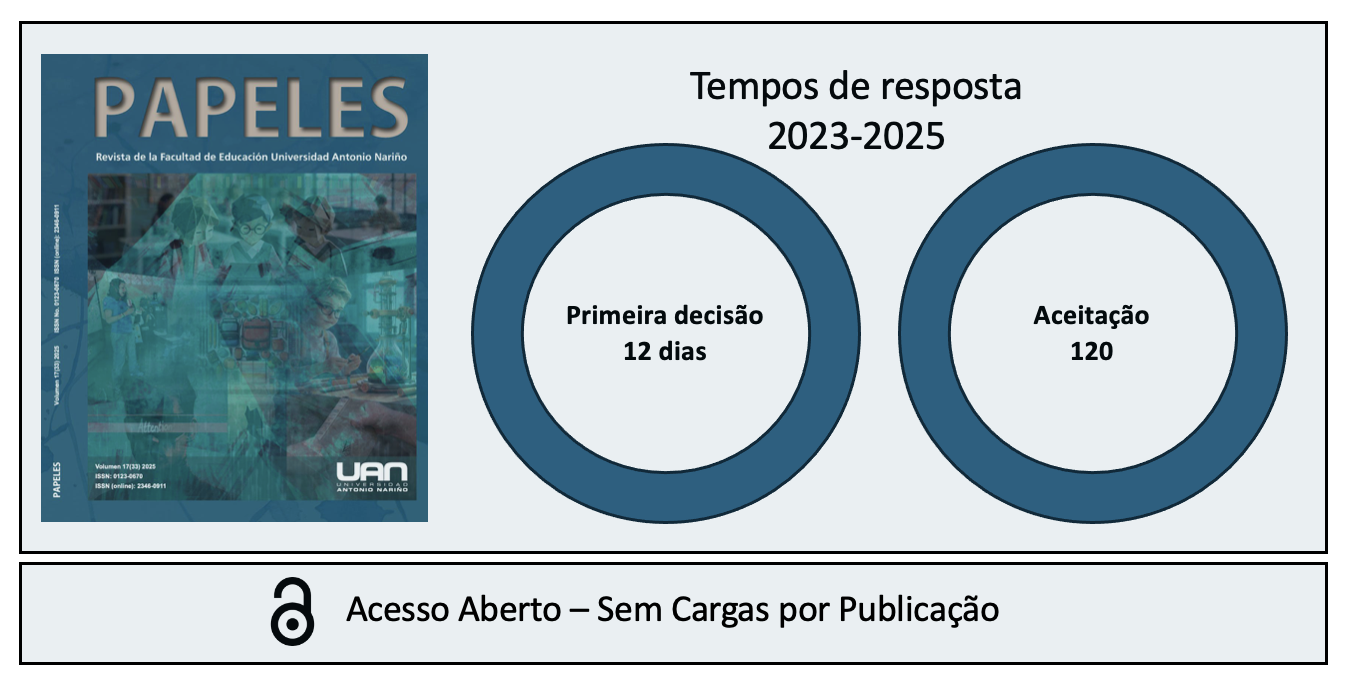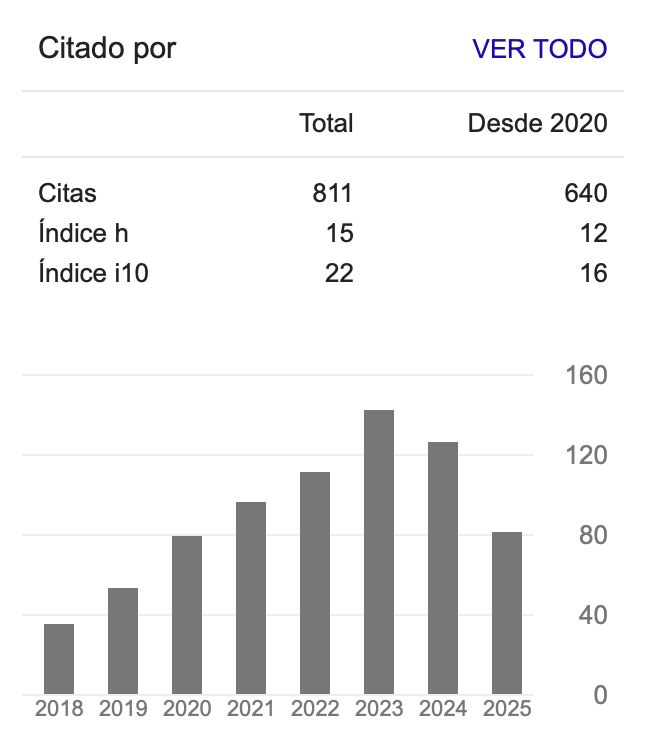La prescripción individualizada de estrategias de aprendizaje a un adulto con bajo nivel de inglés
The Prescription of Individualized Learning Strategies to an Adult Low-English Language Achiever
DOI:
https://doi.org/10.54104/papeles.v14n27.1119Palavras-chave:
Estrategias de aprendizaje, Produccion oral, Enseñanza de estrategias, Repertorio de estrategiasResumo
La enseñanza de estrategias de aprendizaje de una segunda lengua sugiere que es necesario enseñar a los estudiantes el funcionamiento y beneficio de las estrategias de aprendizaje. Sin embargo, aun no es claro porque los estudiantes de bajo rendimiento no progresan significativamente aun cuando aspectos relevantes en su aprendizaje son mejorados. El objetivo de este estudio centró su atención en un estudiante de idiomas adulto de 55 años con un rendimiento bajo en el aprendizaje de inglés. Se siguió una metodología de investigación cualitativa a través de una entrevista semiestructurada, el análisis de necesidades y la observación. Los resultados indicaron que las estrategias de enseñanza con el objetivo de mejorar una habilidad específica no muestran una mejora significativa en su rendimiento cuando utiliza el inglés. Sin embargo, el alumno mostró el despliegue de una serie de estrategias que le ayudaron a manejar la situación del habla. Además, se comprobó que la motivación toma una relevancia significativa no solo en el uso de nuevas estrategias, sino que en el aprendizaje de la lengua.
Downloads
Referências
Anderson, N. (2005). L2 learning strategies. In E. Hinkel. (Ed), Handbook of research in second language teaching and learning (pp. 757-771). Lawrence Erlbaum.
Baumeister, R. F. (2016). Toward a general theory of motivation: Problems, challenges, opportunities, and the big picture. Motivation and Emotion, 40, 1-10. https://doi.org/10.1007/s11031-015-9521-y
Brown, A., & Palincsar, A. (1982). Inducing strategic learning from text by means of informed, self-control training. Topics in Learning and Learning Disabilities, 2 (1), 1-17. https://www.ideals.illinois.edu/bitstream/handle/2142/17590/ctrstreadtechrepv01982i00262_opt.pdf?sequence=1
Bruen, J. (2001) Strategies for Success: Profiling the Effective Learner of German. Foreign Language Annals, 34 (3), 216-225. https://doi.org/10.1111/j.1944-9720.2001.tb02403.x
Chamot, A. (2005). Language learning strategy instruction: current issues and research. Annual Review of Applied Linguistics, 25, 112-130. https://doi.org/10.1017/S0267190505000061
Chamot, A., Barnhardt, S., El-Dinary, P., & Robbins, J. (1999). The learning strategies handbook. Addison Wesley Longman.
Cohen, A. (2014). Strategies in Learning and Using a Second Language. 2nd edition London: Routledge. https://doi.org/10.4324/9781315833200
Dörnyei, Z. (2006). Individual differences in second language acquisition. AILA Review, 19(1) 42 - 68 https://doi.org/10.1075/aila.19.05dor
Dudley-Evans, T., & St. John, M. (1998). Developments in ESP: A multi-disciplinary approach. Cambridge University Press.
Ellis, R. (1993). Talking shop. Second Language Acquisition research: How does it help teachers? An interview with Rod Ellis. ELT journal, 47(1), 3-11. https://doi.org/10.1093/elt/47.1.3
Erarslan, A., & Höl, D. (2014) A study on language learning strategies of Turkish EFL learners at a state university. Journal of Second and Multiple Language Acquisition, 2(2) 1-21. https://www.researchgate.net/publication/332414924_A_study_on_language_learning_strategies_of_Turkish_EFL_learners_at_a_state_university
Griffiths C. (2015) What have we learnt from ‘good language learners’?. ELT Journal, 69 (4), 425–433. DOI: https://doi.org/10.1093/elt/ccv040
Hutchinson, T., & Waters, A. (1987). English for specific purposes. Cambridge University Press.
Liangqiu, L., & Zhengqiu, X. (2019) A Case Study on L2 Learning Strategies of Middle-Aged Learners. English Language Teaching, 12 (3) 214-219. https://doi.org/10.5539/elt.v12n3p214
O’Malley, J., & Chamot, A. (1990). Learning strategies in second language acquisition. Cambridge University Press. https://doi.org/10.1017/CBO9781139524490
Oxford, R. (1990). Language learning strategies: What every teacher should know. Heinle y Heinle.
Oxford, R. (2003). Language learning styles and strategies: Concepts and relationships. IRAL, 41(4), 271-278 1-25. https://doi.org/10.1515/iral.2003.012
Panzachi Heredia, D. A. R., & Luchini, P. L. (2015). On becoming a good English language learner: An exploratory case study. HOW, 22 (1), 26-44. https://doi.org/10.19183/how.22.1.116
Reeve, J. (2015). Understanding motivation and emotion (6th ed.). Wiley.
Ríos Villamizar, D. (2014) Language Learning Strategies and English Proficiency: Case Study. Opening Writing Doors. 11 (1), 35-79. http://revistas.unipamplona.edu.co/ojs_viceinves/index.php/OWD/article/view/1339/625
Rubin, J. (1975). What The "Good Language Learner" Can Teach Us. TESOL Quarterly, 9(1), 41-51. https://doi.org/10.2307/3586011
Samperio, N. (2019) Are low achievers low strategy users? Lenguas Modernas, (53), 107-126. https://lenguasmodernas.uchile.cl/index.php/LM/article/view/55450/60857
Samperio, N. (2018a) General learning strategies and the transfer to language learning: identification and effect on language achievement. Editorial Académica Española.
Samperio Sánchez, N. (2018b) An Experience in the Teaching of Language Learning Strategies. Voces y Silencios: Revista Latinoamericana de Educación, 9 (2), 165-177. https://doi.org/10.18175/vys9.2.2018.10
Zewdie, A. (2015). An investigation of language learning strategy use in an ESP context: Hotel management students in focus. English for Specific Purposes World, 47, 1-17. http://esp-world.info/Articles_47/47_Alemayehu%20Zewdie_Investigation.pdf
Downloads
Publicado
-
Resumo582
-
PDF (Español)132
Como Citar
Edição
Seção
Categorias
Licença
Copyright (c) 2022 Nahum Samperio Sánchez

Este trabalho está licenciado sob uma licença Creative Commons Attribution-NonCommercial-ShareAlike 4.0 International License.






